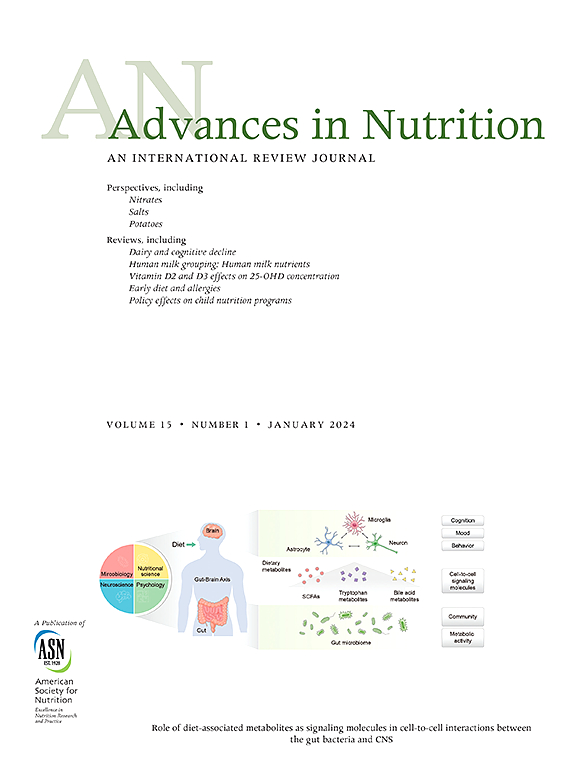Medical Nutrition Therapy (MNT) Evidence Update: Comparative Effectiveness of Dietary Programs for Reducing Mortality and Cardiovascular Events in Adults with Increased Cardiovascular Disease Risk
IF 9.2
1区 医学
Q1 NUTRITION & DIETETICS
引用次数: 0
Abstract
Health services question
In adults with established cardiovascular disease (CVD) risk factors, as compared with minimal intervention, what is the most effective dietary program intervention, with or without pharmacological management, physical activity, and behavioral support cointerventions, for reducing risk of early mortality and major cardiovascular events based on the best available systematic review and network meta-analyses of randomized clinical trials (RCTs)?
Bottomline
Based on 40 RCTs evaluating 7 dietary programs, moderate certainty evidence suggests that Mediterranean dietary programs (for example, high in vegetables, fruits, extra virgin olive oil, nuts, legumes, and fish), accompanied by varying cointerventions including pharmacological management (for example, statins), physical activity and behavioral support (for example, nutrition education, smoking cessation, and stress management), were superior to minimal interventions for reducing risk of all cause [1.7% absolute risk reduction (ARR)], cardiovascular mortality (1.3% ARR), stroke (0.7% ARR), and myocardial infarction (1.7% ARR) in patients with established CVD risk factors (for example, obesity, hypertension, dyslipidemia, or a previous cardiovascular event) over a 5-y period. Results from randomized trials with food provisions (for example, extra virgin olive oil, mixed nuts, primarily walnuts) among those living in Mediterranean regions had the largest treatment effects. Similarly, moderate certainty evidence demonstrated that low-fat dietary programs (for example, 20–30% total fat, <10% saturated fat, and high in fish, vegetables, and fruits together with varying cointerventions) were superior to minimal intervention for reducing all-cause mortality (0.9% ARR) and myocardial infarction (0.7% ARR) based on trials conducted in Mediterranean, North American, and Northern European regions. Network metaregression did not detect statistically significant differences in estimates when controlling for the presence of pharmacological management, physical activity, and behavioral support.

MNT证据更新:降低心血管风险增加的成人死亡率和心血管事件的饮食计划的比较有效性。
临床问题:根据随机临床试验(rct)的最佳系统评价和网络荟萃分析,与最小干预相比,在有或没有药物管理、身体活动和行为支持联合干预的情况下,对于降低早期死亡和主要心血管事件的风险,最有效的饮食计划干预是什么?底线:中度确定性证据表明,地中海饮食计划(如大量蔬菜、水果、特级初榨橄榄油、坚果、豆类和鱼类)加上各种联合干预措施,包括药理学管理(如他汀类药物)、身体活动和行为支持(如营养教育、戒烟、压力管理),在降低全因风险方面优于最小干预措施(绝对风险降低1.7% [ARR])。在具有心血管危险因素(如肥胖、高血压、血脂异常或既往心血管事件)的患者中,5年内心血管死亡率(1.3% ARR)、卒中(0.7% ARR)和心肌梗死(1.7% ARR)。在地中海地区生活的人群中,提供食物(如特级初榨橄榄油、混合坚果(主要是核桃))的随机试验结果显示,治疗效果最大。同样,中等确定性的证据表明,低脂饮食计划(如:
本文章由计算机程序翻译,如有差异,请以英文原文为准。
求助全文
约1分钟内获得全文
求助全文
来源期刊

Advances in Nutrition
医学-营养学
CiteScore
17.40
自引率
2.20%
发文量
117
审稿时长
56 days
期刊介绍:
Advances in Nutrition (AN/Adv Nutr) publishes focused reviews on pivotal findings and recent research across all domains relevant to nutritional scientists and biomedical researchers. This encompasses nutrition-related research spanning biochemical, molecular, and genetic studies using experimental animal models, domestic animals, and human subjects. The journal also emphasizes clinical nutrition, epidemiology and public health, and nutrition education. Review articles concentrate on recent progress rather than broad historical developments.
In addition to review articles, AN includes Perspectives, Letters to the Editor, and supplements. Supplement proposals require pre-approval by the editor before submission. The journal features reports and position papers from the American Society for Nutrition, summaries of major government and foundation reports, and Nutrient Information briefs providing crucial details about dietary requirements, food sources, deficiencies, and other essential nutrient information. All submissions with scientific content undergo peer review by the Editors or their designees prior to acceptance for publication.
 求助内容:
求助内容: 应助结果提醒方式:
应助结果提醒方式:


